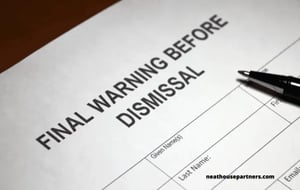The Ultimate Guide to Keeping Workplace Christmas Parties Safe and Legal
Discover how to plan and manage your workplace Christmas party safely and legally. This guide explains employer liability, discrimination risks, and practical steps to prevent misconduct, ensuring an inclusive and compliant festive celebration.
Joe Hennessy
Employment Lawyer Joe is an experienced Employment Lawyer with a background in both contentious and non-contentious employment matters.Date
12 November 2025Updated
12 November 2025
Season’s Greetings!
As the year draws to a close and teams make their final push to meet targets, complete billing cycles, and wrap up outstanding projects, workplaces collectively exhale. The brief lull before the next cycle begins is marked, of course, by the office Christmas party, that peculiar mix of celebration and caution.
While these gatherings are a welcome opportunity for colleagues to relax and connect, they can also create fertile ground for misconduct. If not managed carefully, the line between personal and professional can blur, turning what should be a night of good cheer into a potential legal issue. This guide explains how to plan, manage, and follow up on work events safely and lawfully.
Understanding Vicarious Liability in Relationship to Christmas Parties
Vicarious liability refers to the circumstances in which an employer can be held legally responsible for the wrongful acts of an employee committed “in the course of employment”. When deciding whether this principle applies, a tribunal will usually ask two questions:
- Is there a relationship of employment (or akin to employment) between the employer and the wrongdoer; and
- How closely connected was the wrongdoing to the acts that the wrongdoer was authorised to do?
If both parts of the test are satisfied, the employer may still be liable unless it can show that it took all reasonable steps to prevent the misconduct. This defence has become even more important following the Worker Protection (Amendment of Equality Act 2010) Act 2023, which introduces a proactive duty to prevent sexual harassment before it happens.
Misconduct does not need to occur during working hours or on company premises to create liability. Social events, parties, and off-site gatherings can all be classed as work-related activities, meaning employers remain responsible under employment, discrimination, and health and safety law.
Bellman v Northampton Recruitment Ltd
A key case on this issue is Bellman v Northampton Recruitment Ltd. After a company Christmas party, the managing director, Mr Major, organised an informal after-party at a nearby hotel. As the evening went on and alcohol flowed, staff began to criticise his management style. Frustrated, Mr Major lectured them on his authority and, when one employee, Mr Bellman, challenged him, he struck him twice, causing serious brain injury. Although the company had not arranged the after-party and attendance was voluntary, the Court of Appeal found the employer vicariously liable. The court held that, in asserting his managerial authority, Mr Major was acting within the scope of his role. His seniority and power over staff created a sufficient connection to his employment for liability to attach.
Managing Misconduct and Protected Staff
The Bellman case illustrates the importance of managing misconduct risks at social events. The UK’s drinking culture can easily blur professional boundaries, but employers must take reasonable steps to ensure that all staff are treated fairly, included respectfully, and protected from harm.
Vicarious liability is not limited to physical violence. Under the Equality Act 2010, employers can also be held responsible for harassment or discrimination that occurs at work-related events. This includes behaviour linked to any protected characteristic. Namely age, sex, gender reassignment, race, disability, religion or belief, marital status, pregnancy, or sexual orientation.
The guiding principle is inclusivity. Not everyone drinks alcohol, and assumptions about who will or will not participate can cause exclusion or offence. Employers should plan events that are considerate of cultural, religious, and personal differences, ensuring that everyone feels welcome. This point was underlined in Amal Abdi v Odeon Cinemas, where a Muslim employee was not invited to the company’s Christmas party because alcohol would be served. The tribunal found that the exclusion was discriminatory. Employers should never make assumptions about participation or preferences; it is entirely possible to celebrate together in an inclusive and respectful way.
Discrimination and Harassment in Practice (Staff Christmas Parties)
Discrimination can occur in two ways (a) direct discrimination, which can arise when someone is treated less favourably because of a protected characteristic and (b) indirect discrimination, which can arise when a policy or practice disadvantages a group of people who share a protected characteristic compared to others who do not. Two cases illustrate how this can play out in practice:
Nixon v Ross Coates Solicitors & Another
Following the firm’s Christmas party, the claimant was seen kissing a male colleague, and the two later went to a hotel together. Shortly after, she announced she was pregnant, which triggered widespread office gossip. The attention and speculation caused her significant distress, and she was eventually signed off sick. When she raised a grievance about the treatment, the employer refused to investigate. She brought claims for sex and pregnancy discrimination. The Employment Appeal Tribunal acknowledged that her own conduct had contributed to the gossip but still found in her favour, holding that the employer’s failure to deal appropriately with the situation and its refusal to pay sick leave amounted to discriminatory treatment.
McClellan v Dow Jones
In this case, a male and middle-aged accounts manager was instructed by his female manager to dress as Santa Claus for the company’s Christmas party. She described him as an “old buffer” and said he would be the perfect fit for the role. The claimant felt humiliated and argued that he had been treated less favourably because of his age and sex. The Employment Tribunal agreed, finding that the comments and the forced participation amounted to direct discrimination and was awarded a substantial amount of compensation.
Harassment is unwanted conduct related to a protected characteristic that violates a person’s dignity or creates an intimidating, hostile, degrading, humiliating, or offensive environment. Employers must take reasonable steps to prevent such behaviour, particularly at social events where alcohol can blur boundaries.
In Lyons v Starplan, a male colleague made a sexual remark about the claimant and hugged her from behind without consent after a Christmas party. The Tribunal found this to be sexual harassment and awarded £19,000 in compensation. Of course, harassment is not always so overt. Even a Secret Santa gift or joke can amount to harassment if it causes offence linked to a protected characteristic or undermines someone’s dignity.
Reducing the Risk of Liability for Work Christmas Parties
Employers can significantly limit exposure to claims by planning Christmas parties with care. The key is foresight: identify risks early, set expectations clearly, and act promptly if problems arise. The High Court’s decision in Shelbourne v Cancer Research UK illustrates this point. The employer had carried out a detailed risk assessment that recognised alcohol would be consumed and restricted access to hazardous areas. When a guest was later injured, the court found that the employer had done all it reasonably could to prevent harm and was not liable.
Planning the Workplace Christmas Party: Preventative Steps to Reduce HR Issues
- Clarify the Nature of the Event: Confirm that the function is a work-related activity and that professional standards of conduct still apply. Make attendance voluntary to avoid any suggestion of discrimination linked to religion, caring responsibilities, or personal beliefs.
- Choose the Venue Carefully: Select a location that is accessible, reputable, and properly insured. Ensure that both food and non-alcoholic options are available and that the venue complies with all health and safety requirements
- Manage Alcohol Consumption: Set limits on free drinks and providing ample water and soft options. Always ensure food is served and appoint senior members of staff to stay sober and oversee the event. Excessive alcohol is one of the leading factors behind misconduct at work functions.
- Communicate Expectations: Send a pre-event reminder outlining expected standards of behaviour and linking to key workplace policies, including those covering harassment, discrimination, and disciplinary action. Remind employees to act responsibly, especially where alcohol is involved.
- Designate Responsible Managers: Assign a few managers or HR representatives to keep a discreet watch throughout the evening. Their role is to intervene early if inappropriate behaviour occurs, handle any complaints, and ensure the safety of all attendees.
- Plan for Safe Travel: Employers have a continuing duty of care, even after the party ends. Provide or subsidise safe transport home, such as taxi vouchers or organised group travel, and confirm that the venue is accessible by public transport.
- Encourage Inclusivity: Be mindful that not all staff drink alcohol or celebrate Christmas. Avoid activities or language that may exclude anyone based on culture, religion, or lifestyle.
During the Event: Maintaining Control of a Workplace Christmas Party
At the outset, it is good practice for a senior manager or HR representative to remind attendees that the event remains a work-related function and that professional standards of conduct continue to apply. Conversations should stay appropriate; avoid remarks that could offend or stray into confidential or sensitive topics such as promotions or company finances.
In Judge v Crown Leisure Ltd, the Employment Appeal Tribunal observed that the employer had been “lucky” to avoid liability after a manager told an employee at a Christmas party that he would receive a higher rate of pay within two years. The promise was not fulfilled, and the employee later resigned. The Tribunal found that, given the informal context and the fact that the employee had received pay increases during that period, the remark did not amount to a binding agreement.
Throughout the event, behaviour should be monitored discreetly, with early intervention if anyone appears intoxicated, uncomfortable, or at risk. Inclusivity should remain a priority so that all employees feel welcome and respected. Any issues or incidents that arise should be recorded for review once the event concludes.
After the Event: Responding to Christmas Party HR Issues
If an incident or complaint is reported, the employer should act quickly and fairly. Investigations must be conducted promptly, impartially, and with confidentiality. Witness accounts and any relevant evidence should be gathered, and disciplinary procedures applied in accordance with company policy. Support should be offered to any affected employees, and once the matter is resolved, the event planning process should be reviewed to identify lessons and strengthen future safeguards.
Final Thoughts
Workplace Christmas party celebrations can be an excellent way to build morale and strengthen team spirit, but they must be managed with care and foresight. Employers who plan thoughtfully, communicate expectations clearly, and respond promptly to problems can create events that are safe, inclusive, and genuinely enjoyable without inviting legal risk.
Related blog posts

Transgender Rights in the Workplace in Relation to the Equality Act & Discrimination

Labour’s U-turn On Unfair Dismissal Rights: What a Six-Month Qualifying Period Means for Employers

What is gross misconduct at work? A guide for employers

Final Written Warning: What UK Employers Need to Know
Have questions?
Get in touch today
Contact us, and our team will get back to you within 24 hours. We value your questions and are committed to getting them answered quickly.


Hello! I am Nicky
Just fill in the form below with your details, and I will arrange for a member of our team to give you a call.
By clicking, you agree to our Privacy Policy




